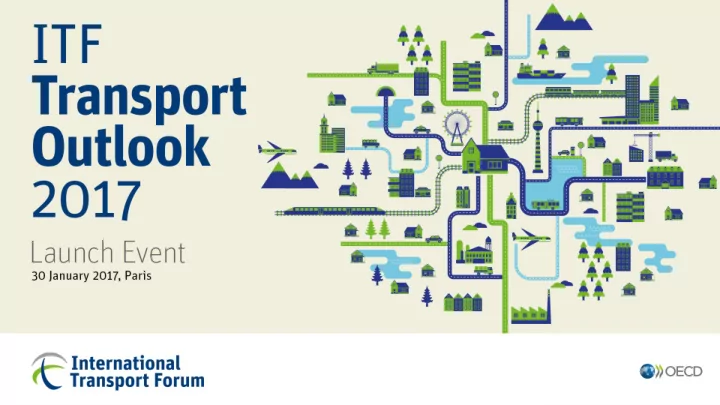

1
I n OECD, transport rem ains the sector w ith the fastest-grow ing CO 2 em issions 2
The per capita CO 2 em issions gap w ith OECD w ill close as non-OECD econom ies grow 3
Global transport volum es w ill continue to expand Passenger transport will more than double by 2050 Global car stock: from 1 billion in 2015 to 2.4 billion in 2050 Freight transport is projected to triple 4
Global transport volum es w ill continue to expand Passenger transport will more than double by 2050 Number of cars worldwide will grow to 2.4. billion in 2050, from 1 billion in 2015 Freight transport is projected to triple 5
I f unchecked, transport CO 2 em issions could increase 6 0 % by 2 0 5 0 6
International Freight 7
Global freight patterns w ill shift 8
Hinterland connections are high-em itting - but can be addressed by national policies Port-Hinterland connections represent 7% of international freight volume… … but 30% of its CO 2 emissions and 80% of trade-related transport costs Hinterland links are subject to national policies not international agreements, so these emissions are easier to address 9
New technologies w ill not be enough to reduce freight CO 2 em issions Higher fuel efficiency and alternative fuels can reduce reight CO 2 emissions by 40% But new technologies alone cannot curb the trend of growing freight emissions Truck sharing, route optimisation, relaxing of delivery windows and more operational efficiency generally can hold 2050 emissions at 2015 levels 10
International Passenger Aviation 11
Air passenger num bers w ill quadruple by 2 0 5 0 ; strongest grow th in Asia Economic progress in developing countries Liberal air regulation facilitates strong expansion of air network More low-cost carriers boost intra-regional passenger numbers 12
Long-term m itigation strategy for aviation rests on biofuels Industry commitment to bring aviation CO 2 emissions to half their 2005 level by 2050 Requires 70-100% share of biofuel by 2050 Uncertainties exist regarding sufficient availability and price and of aviation biofuels 13
Mobility in Cities 14
Cities need to m ake a choice now on how future m obility needs w ill be m et Transport demand in cities to double by 2050… … as will car use in the baseline scenario. Pricing, public transport supply, integrated land-use/ transport planning can provide the same mobility in a more sustainable way Such policies could keep the level of private car use in cities at 2015 levels 15
The right policies can significantly cut transport CO 2 em issions in cities 70% of reductions can come from new technologies: more efficient engines, electric mobility, other alternative fuels, etc. 30% of these require policies that change human behaviour: incentives for car sharing, pricing of fuel and parking, etc. 16
Relying on cars to provide accessibility in cities is not sustainable Urban sprawl and reliance on cars will require large infrastructure investments Fast-growing cities need to change their model of development. 17
Urban m obility is about providing access to opportunities Good access to public transport is not necessarily the same as good access to jobs, schools, health services, leisure activities, friends Policy should shift from focusing on access to public transport to access of inhabitants to opportunities that improve their lives 18
Currently foreseeable policies to m itigate transport CO 2 are not sufficient to achieve clim ate am bitions Transport will emit c. 7.5 giga-tonnes of CO 2 in 2050, roughly the same as in 2050 Accelerated innovation and radical policy choices on issues such as shared mobility, changes in supply chains, new transport modes are required. 19
www.transportpolicymatters.org 20
Recommend
More recommend